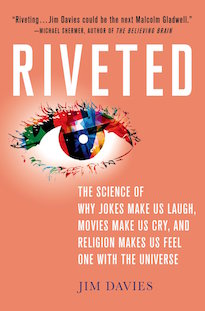 Cognitive scientist and author Jim Davies joins the crew this week for a riveting discussion about his book ‘Riveted.” Next Adam surveys the evidence about whether political polling is effective. Lastly, Cristina chews on the question of whether extraneous factors affect judicial decisions. Enjoy!
Cognitive scientist and author Jim Davies joins the crew this week for a riveting discussion about his book ‘Riveted.” Next Adam surveys the evidence about whether political polling is effective. Lastly, Cristina chews on the question of whether extraneous factors affect judicial decisions. Enjoy!
Download direct: mp3 file
If you like the show, please leave us a review on iTunes!
Jim Davies and Riveted
Is Polling Effective?
What’s the Matter With Polling? – The New York Times
Why telephone polling used to be the best and why it’s dying out – The Globe and Mail
Extraneous Factors and Judicial Decisions
Wired: To Get Parole, Have Your Case Heard Right After Lunch
PNAS: Extraneous factors in judicial decisions
Discover: Justice Is Served, But More So After Lunch








The effect of the 2nd most expensive marketing trick is a result of anchoring bias. The effect is likely more effective by listing the most expensive item first, it is also the same reason that the person listed at the top of a ballot gains a boost in elections.
Well done, Trevor. You’re not the first answer in but you are quite correct.
I like Jim Davies’s explanation for why judges may get less and less lenient over time. I thought the exact same thing and exulted when he mentioned it. If this has not been advanced as a theory, it should be.
As a teacher myself, I find myself marking papers more “grouchily” as I proceed through them, especially when I find the same mistake over and over. Same goes for excuses. I used to joke to my Saudi ESL students that the hospitals seem to get overloaded with ill grandmothers as final exams closed in them. Therefore I tend to favor the idea that judges simply get less tolerant of excuses as the session wears on…and then “reboot” after a break.
But my primary reason for writing is to advance the theory (not mine) that wine bars, recognizing that a lot of patrons don’t want to appear chintzy by choosing the cheapest wine on the menu (especially on a date) , will attempt to move the customer to the second wine, which is the one they can make a better profit on. Thus, the cheapest wine acts as an anchor to get the patron to move one notch up.